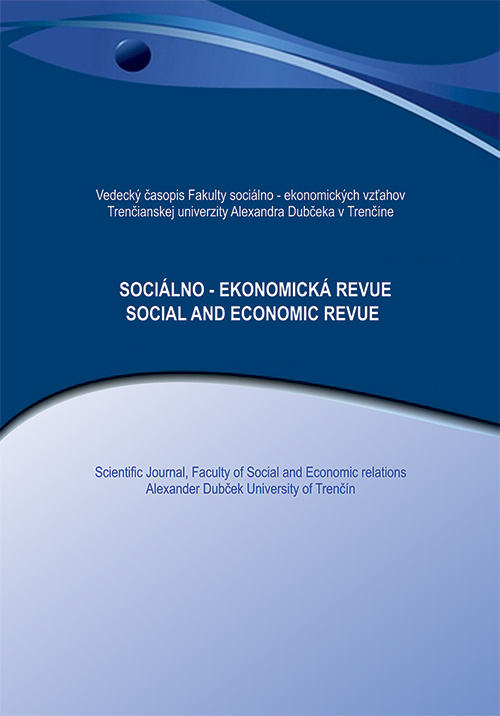IMPACT OF THE SHARING ECONOMY ON FUTURE BUSINESS MODELS
The growth of the sharing economy is probably one of the most meaningful global socio-economic evolution in the past ten years (Koen Franken, 2017). The definition “sharing economy” is mostly used to describe the business model with digitized platforms for peer-to-peer exchanges (Geissinger et al., 2019; Belk, 2014; Juho et al., 2016). This article presents an approach to research that estimates the sharing economy and principally the main factors and conditions, what stimulates and drives the development of sharing economy as a perspective business model. Firstly, we define the understanding of sharing economy as one of the most engaging business models in nowadays according to economic literature study. Secondly, we conduct the analysis of the perspective and sustainable evolution of sharing economy mostly in the past decade. Furthermore, we identify forces which are driving the sharing economy for economic development. Thus, we design the conceptual framework of the sharing economy as a perspective and digitally based business model.
Vydanie: 2019/3 Strany: 64-74 Klasifikácia JEL: O10, O11, O12
DOI:
Kľúčové slová: international business, business dynamics, economic development, sharing economy, business models, digitalization
Sekcia:
Kontakty:
Mgr. Vilma Karoblienė,
PhD student,
Kaunas University of Technology (Lithuania),
School of Economics and Business
Gedimino st. 50, Kaunas, Lithuania.
E-mail: vilma.karobliene@ktu.lt
Prof. dr. Vaida Pilinkienė, PhD,
Kaunas University of Technology (Lithuania),
School of Economics and Business
Gedimino st. 50, Kaunas, Lithuania.
E-mail: vaida.pilinkiene@ktu.lt
Dr. Anna Feruś,
Rzeszow University of Technology (Poland)
Faculty of Management
al. Powstańców Warszawy 12 35-959 Rzeszów
E-mail: aferus@prz.edu.pl
Literatúra:
Acquier Aurelien, Carbone Valentina, and Masse David. 2019. Technology Innovation Management Review. (Volume 9, Issue 2)
Acquier Aurelien, Daudigeosb Thibault, Pinksec Jonatan. 2017. Promises and paradoxes of the sharing economy: An organizing framework. Technological Forecasting & Social Change 125, 1–10, http://dx.doi.org/10.1016/j.techfore.2017.07.006
Aloni, E. Pluralizing the “sharing” economy. Wash. Law Rev. 2016, 91, 1397–1459.
Bardhi F., Eckhardt G.M. 2012. Access-based consumption: the case of car sharing. J. Consum. Res. 39(4), 881–898.
Barnes Stuart J., Mattsson Jan. 2016. Understanding current and future issues in collaborative consumption: A four-stage Delphi study. Technological Forecasting & Social Change 104 200–211. http://dx.doi.org/10.1016/j.techfore.2016.01.006
Belk Russell. 2014. You are what you can access: Sharing and collaborative consumption online. Journal of Business Research 67, 1595–1600. http://dx.doi.org/10.1016/j.jbusres.2013.10.001
Böcker Lars, Meelen Toon. 2017. Sharing for people, planet or profit? Analysing motivationsfor intended sharing economy participation Environmental Innovation and Societal Transitions 23, 28–39. http://dx.doi.org/10.1016/j.eist.2016.09.004
Botsman R, Rogers R. 2010. What’s Mine is Yours: The Rise of Collaborative Consumption. New York: Harper Collins.
Campbell Charlie. 2018. The Trouble with Sharing: China's Bike Fever Has Reached Saturation Point. [online, accessed on 1 May 2019] http://time.com/5218323/china-bicycles-sharing-economy/
Cheng Mingming. 2016. Sharing economy: A review and agenda for future research. International Journal of Hospitality Management 57, 60–70. http://dx.doi.org/10.1016/j.ijhm.2016.06.003
Curtis Steven Kane and Lehner Matthias. 2019. Defining the Sharing Economy for Sustainability. Sustainability 2019, 11, 567; doi:10.3390/su11030567
Dakhlia Sami, Davila Andrés and Cumbie Barry. 2016. Trust, but Verify: The Role of ICTs in the Sharing Economy. Information and Communication Technologies in Organizations and Society Lecture Notes in Information Systems and Organisation, Vol. 15, 303-311, https://doi.org/10.1007/978-3-319-28907-6_20
Dudek Dariusz, Robert Sałek. 2016. The concept of sharing goods as a manifestation of information technology transformation in rural areas. Zeszyty Naukowe Politechniki Częstochowskiej Zarządzanie Nr 21,s. 124–133. http://www.zim.pcz.pl/znwz
Evans Peter C., Gawer Annabelle. 2016. The rise of the platform enterprise: A Globa Survey, The Center for Global Enterprise.
Frenken Koen, Schor Juliet. 2017. Putting the sharing economy into perspective. Environmental Innovation and Societal Transitions 23, 3–10. http://dx.doi.org/10.1016/j.eist.2017.01.003
Frenken Koen. 2017. Sustainability perspectives on the sharing economy. Environmental Innovation and Societal Transitions 23, 1–2. http://dx.doi.org/10.1016/j.eist.2017.04.004
Gansky L., The Mesh: Why the Future of Business Is Sharing, Penguin Books, New York 2010, p. 56.
Geissinger Andrea, Laurell Christofer, Oberg Christina, Sandstr Christian (2019). How sustainable is the sharing economy? On the sustainability connotations of sharing economy platforms. Journal of Cleaner Production 206, 419e429. https://doi.org/10.1016/j.jclepro.2018.09.196
Godelnik Raz. 2015. Millennials and the sharing economy: Lessons from a ‘buynothing new, share everything month’ project. Environmental Innovation and Societal Transitions 23, 40–52. http://dx.doi.org/10.1016/j.eist.2017.02.002
Gregory Hodkinson, Hazem Galal, Cheryl Martin. 2017. Collaboration in Cities: From Sharing to “Sharing Economy”. World Economic Forum, committed to improving the state of the world, is the International Organization for Public-Private Cooperation. [online access]. http://www3.weforum.org/docs/White_Paper_Collaboration_in_Cities_report_2017.pdf
Habibi Mohammad Reza, Davidson Alexander, Laroche Michel. 2017. What managers should know about the sharing economy. Business Horizons 60, 113—121. http://dx.doi.org/10.1016/j.bushor.2016.09.007
Hamari Juho, Mimmi Sjöklint, Antti Ukkonen. 2016. Journal of the for information science and technology, 67(9):2047–2059.
Humphreys, A., & Grayson, K. 2008. The intersecting roles of consumer and producer: A critical perspective on co-production, co-creation and prosumption. Sociological Compass, 2, 963–980. https://doi.org/10.1111/j.1751-9020.2008.00112.x
Kathan Wolfgang, Matzler Kurt, Veider Viktoria. 2016. The sharing economy: your business model’s friend or foe? Business Horizons 59, 663—672. http://dx.doi.org/10.1016/j.bushor.2016.06.006
Ladegaard Isak. 2018. Hosting the comfortably exotic: Cosmopolitan aspirations in the sharing economy. The Sociological Review Monographs. Vol. 66(2) 381–400. https://doi.org/10.1177/0038026118758538
Lamberton, C. P., & Rose, R. L. 2012. When is ours better than mine? A framework for understanding and altering participation in commercial sharing systems. Journal of Marketing, 76(4), 109—125.
Lizzie Richardson. 2015. Performing the sharing economy. Geoforum 67, 121–129. http://dx.doi.org/10.1016/j.geoforum.2015.11.004
Marshall Patrick. 2015. The Sharing Economy. DOI: 10.1177/2374556815601429
Martin Chris J., Upham Paul, Budd Leslie. 2015. Commercial orientation in grassroots social innovation: Insights from thesharing economy Ecological Economics 118, 240–251. http://dx.doi.org/10.1016/j.ecolecon.2015.08.001
Mi Zhifu, Coffman D’Maris. 2019. The sharing economy promotes sustainable societies. Nature communications. 10:1214, https://doi.org/10.1038/s41467-019-09260-4.
Munoz Pablo, Cohen Boyd. 2017. Mapping out the sharing economy: A configurational approach to sharing business modeling. Technological Forecasting & Social Change 125, 21–37.
Oh Sunjoo, Jae Yun Moon. 2016. Calling for a shared understanding of the "sharing Eeconomy”. ICEC'16, August 17-19, 2016, Suwon, Republic of Korea. http://dx.doi.org/10.1145/2971603.2971638
Owyang Jeremiah, Tran Christine, Silva Chris. 2013. The collaborative economy. Altimeter Research Theme: Digital Economies June 4, 2013 [online, accessed on 1 May 2019] https://www.slideshare.net/Altimeter/the-collaborative-economy
PWC. 2015. Consumer Intelligence Series “The Sharing Economy”. https://www.pwc.com/us/en/technology/publications/assets/pwc-consumer-intelligence-series-the-sharing-economy.pdf
Srineck, N. 2016. Platform Capitalism. Polity Press, Malden, MA.
Wilson, M. 2014. Continuous connectivity, handheld computers, and mobile spatial knowledge. Environ. Plan. D: Soc. Space 32, 535–555. https://doi.org/10.1068/d14112
Zhang Yongping, Mi Zhifu. 2018. Environmental benefits of bike sharing: A big data-based analysis. Applied Energy 220, 296–301. https://doi.org/10.1016/j.apenergy.2018.03.101


